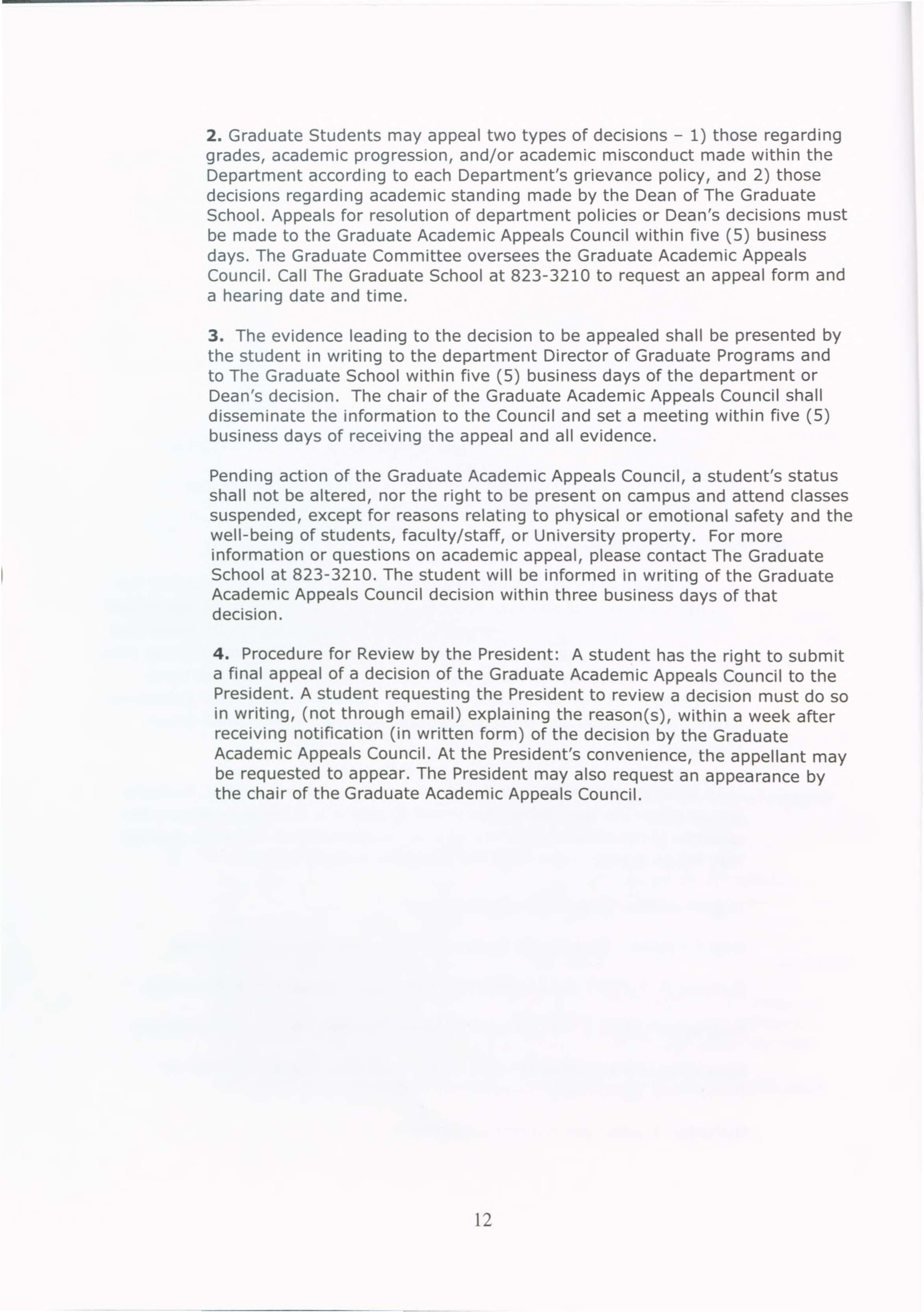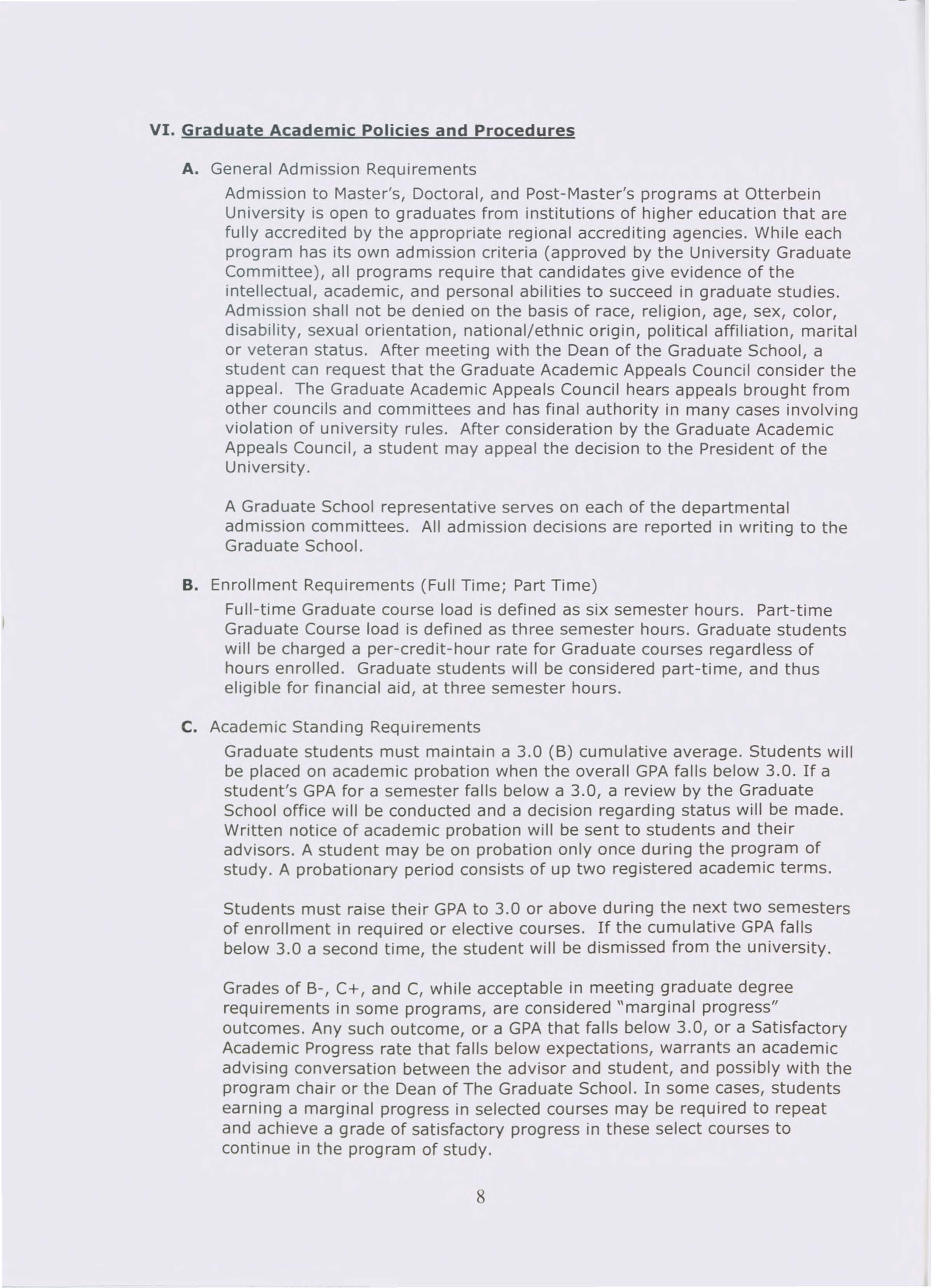
9 minute read
VI. GRADUATE ACADEMIC POLICIES AND PROCEDURES
VI. Graduate Academic Policies and Procedures
A. General Admission Requirements Admission to Master's, Doctoral, and Post-Master's programs at Otterbein University is open to graduates from institutions of higher education that are fully accredited by the appropriate regional accrediting agencies. While each program has its own admission criteria (approved by the University Graduate Committee), all programs require that candidates give evidence of the intellectual, academic, and personal abilities to succeed in graduate studies. Admission shall not be denied on the basis of race, religion, age, sex, color, disability, sexual orientation, national/ethnic origin, political affiliation, marital or veteran status. After meeting with the Dean of the Graduate School, a student can request that the Graduate Academic Appeals Council consider the appeal. The Graduate Academic Appeals Council hears appeals brought from other councils and committees and has final authority in many cases involving violation of university rules. After consideration by the Graduate Academic Appeals Council, a student may appeal the decision to the President of the University.
A Graduate School representative serves on each of the departmental admission committees. All admission decisions are reported in writing to the Graduate School.
B. Enrollment Requirements (Full Time; Part Time) Full-time Graduate course load is defined as six semester hours. Part-time Graduate Course load is defined as three semester hours. Graduate students will be charged a per-credit-hour rate for Graduate courses regardless of hours enrolled. Graduate students will be considered part-time, and thus eligible for financial aid, at three semester hours.
C. Academic Standing Requirements Graduate students must maintain a 3.0 (B) cumulative average. Students will be placed on academic probation when the overall GPA falls below 3.0. If a student's GPA for a semester falls below a 3.0, a review by the Graduate School office will be conducted and a decision regarding status will be made. Written notice of academic probation will be sent to students and their advisors. A student may be on probation only once during the program of study. A probationary period consists of up two registered academic terms.
Students must raise their GPA to 3.0 or above during the next two semesters of enrollment in required or elective courses. If the cumulative GPA falls below 3.0 a second time, the student will be dismissed from the university.
Grades of B-, C+, and C, while acceptable in meeting graduate degree requirements in some programs, are considered "marginal progress" outcomes. Any such outcome, or a GPA that falls below 3.0, or a Satisfactory Academic Progress rate that falls below expectations, warrants an academic advising conversation between the advisor and student, and possibly with the program chair or the Dean of The Graduate School. In some cases, students earning a marginal progress in selected courses may be required to repeat and achieve a grade of satisfactory progress in these select courses to continue in the program of study.
Through the advising process, the University may direct the student to improve graduate-level academic skills (e.g., through a formal study of writing or use of other academic support resources), to take a reduced academic load, or to take other steps to promote academic success.
D. Grading System Graduate school is a process of academic exploration reserved for students who are committed to the high level of work demanded by master's, doctoral or post master's programs. Graduate students are, therefore, held to a higher standard of achievement than undergraduate students. In order to reflect the minimum levels of achievement necessary to award a graduate degree, the grading scales are considerably different than those applied to undergraduates. Specifically, for graduate courses, "A" level work is exemplary, "B" level work is satisfactory, and "B-" or below work does not meet expectations. Grading policies specific to each program are described in the online graduate catalog.
Each student can access his/her grades at the end of each semester on-line via Self-Service Banner/Students tab at www.otterbein.edu. A permanent transcript of all course work attempted and grades earned is maintained in the Office of the Registrar.
The following grades from letter-graded courses are included in the calculation of the grade point average (GPA):
A = 100-93% (4.0) A- = 92-90% (3.7) B+ = 89-87% (3.3) B = 86-83% (3.0) B- = 82-80% (2.7) C+ = 79-77% (2.3) C = 76-73% (2.0) c- = 72-70% (1.7) D+ = 69-67% (1.3) D = 66-60% (1.0) F = 59% and below (0.0)
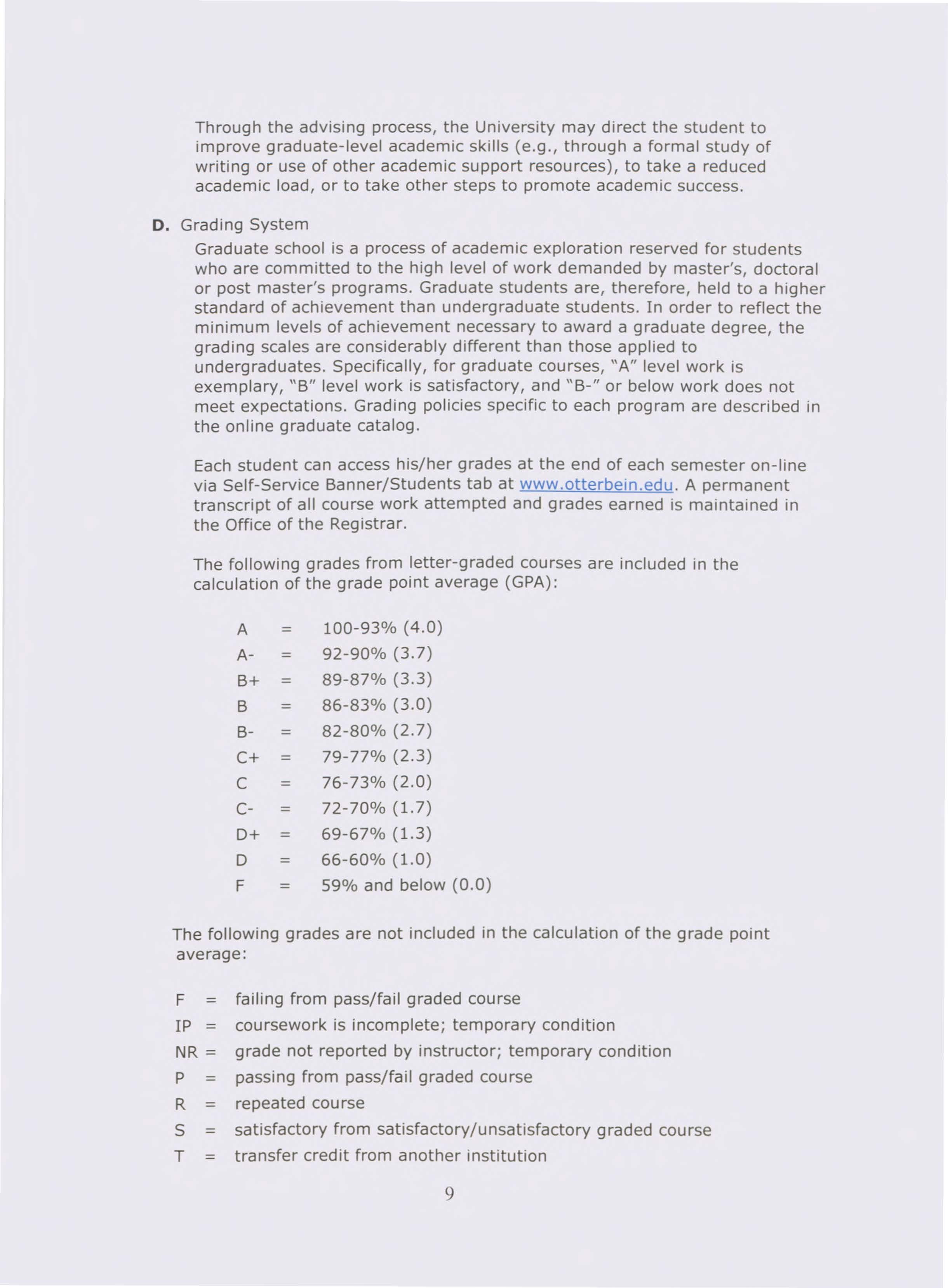
The following grades are not included in the calculation of the grade point average:
F = failing from pass/fail graded course IP = coursework is incomplete; temporary condition NR = grade not reported by instructor; temporary condition P = passing from pass/fail graded course R = repeated course S = satisfactory from satisfactory/unsatisfactory graded course T = transfer credit from another institution
U = unsatisfactory from satisfactory/unsatisfactory graded course W = withdrawal with permission
E. Time Limits After a student has been admitted to a graduate program, continuous progress toward completion of the degree is expected. The time limit for the completion of graduate course work is five years for the Master of Arts in Education, Master of Arts in Teaching, Master of Arts in Educational Mathematics, Master of Science in Allied Health and Master of Business Administration programs. The time limit is six years for the Master of Science in Nursing program and three years for the Post Masters in Nursing programs. The time limit is six years for the Doctor of Nursing Practice program. The time limit is computed from the first date credit is recorded on the college transcript until the program curriculum requirements are completed. Extensions are only considered if there is adequate and unusual cause beyond the control of the student for failure to meet the time limit policy. Petitions requesting extension of the time limit must be submitted to the Graduate Program Director for the MAE, MAT, MAEM, MSAH, and MBA programs. Petitions requesting extension of the time limit for graduate Nursing programs, MSN and DNP, must be submitted to the Department's Curriculum Committee.
Consideration of petitions will take into account whether: 1) there is a reasonable plan for completion; and 2) the individual's knowledge and skills meet current program goals. If approved, an official letter that stipulates the terms of the extension will be sent to the student and his/her academic advisor, and a copy will be placed in the student's file in the Graduate School office.
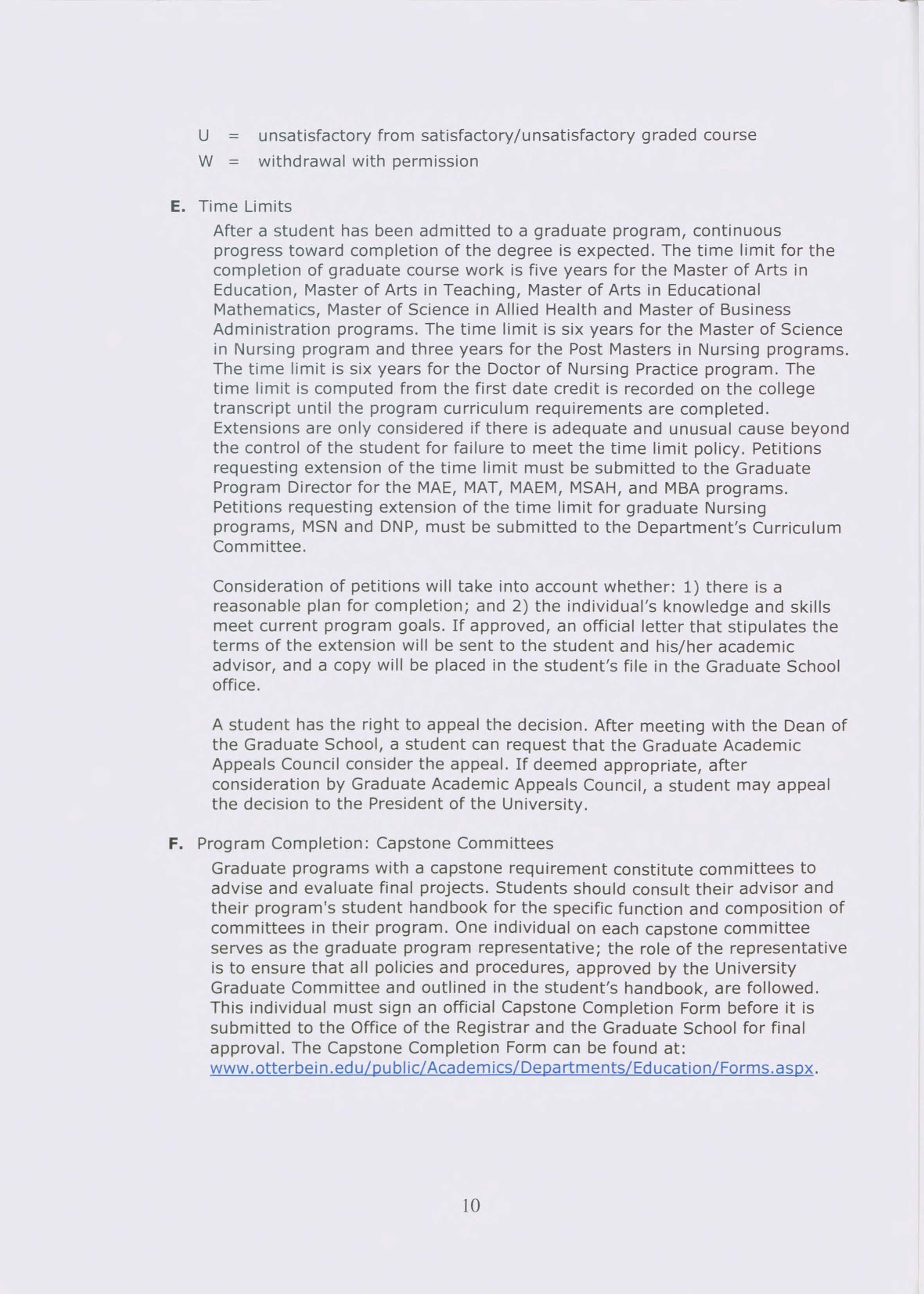
A student has the right to appeal the decision. After meeting with the Dean of the Graduate School, a student can request that the Graduate Academic Appeals Council consider the appeal. If deemed appropriate, after consideration by Graduate Academic Appeals Council, a student may appeal the decision to the President of the University.
F. Program Completion: Capstone Committees Graduate programs with a capstone requirement constitute committees to advise and evaluate final projects. Students should consult their advisor and their program's student handbook for the specific function and composition of committees in their program. One individual on each capstone committee serves as the graduate program representative; the role of the representative is to ensure that all policies and procedures, approved by the University Graduate Committee and outlined in the student's handbook, are followed. This individual must sign an official Capstone Completion Form before it is submitted to the Office of the Registrar and the Graduate School for final approval. The Capstone Completion Form can be found at: www.otterbein.edu/public/Academics/Departments/Education/Forms.aspx.
G. Academic Misconduct Policy Any student who knowingly omits or falsifies admissions materials will not be admitted to Otterbein or will be dismissed, should the falsification be discovered after admittance. Students are responsible for the accuracy of admissions documents submitted to Otterbein. Unintentional omission of documents will not result in dismissal.
In addition to acts of plagiarism and cheating, acts of dishonesty include, but are not limited to the following:
• Furnishing false information to any University official, faculty member or office • Forgery, alteration or misuse of any University document, record or instrument of identification • Falsification, distortion, or misrepresentation of information before a judicial body • Omitting relevant information or data regarding previous college attendance or earned credit (transcripts, etc.)
H. The Appeals Process
1. A graduate student may file an appeal once he or she has completed the departmental student grievance process. Processes are found in department handbooks, The Graduate School Policy Handbook, and on the Otterbein web site. Departmental policies are required by the Ohio Administrative Code, Rule 4723-5-12. Students are first expected to express their views and try to resolve conflict on an informal basis. Ample opportunities exist for students to express these views and concerns through individual and/or small group discussion.
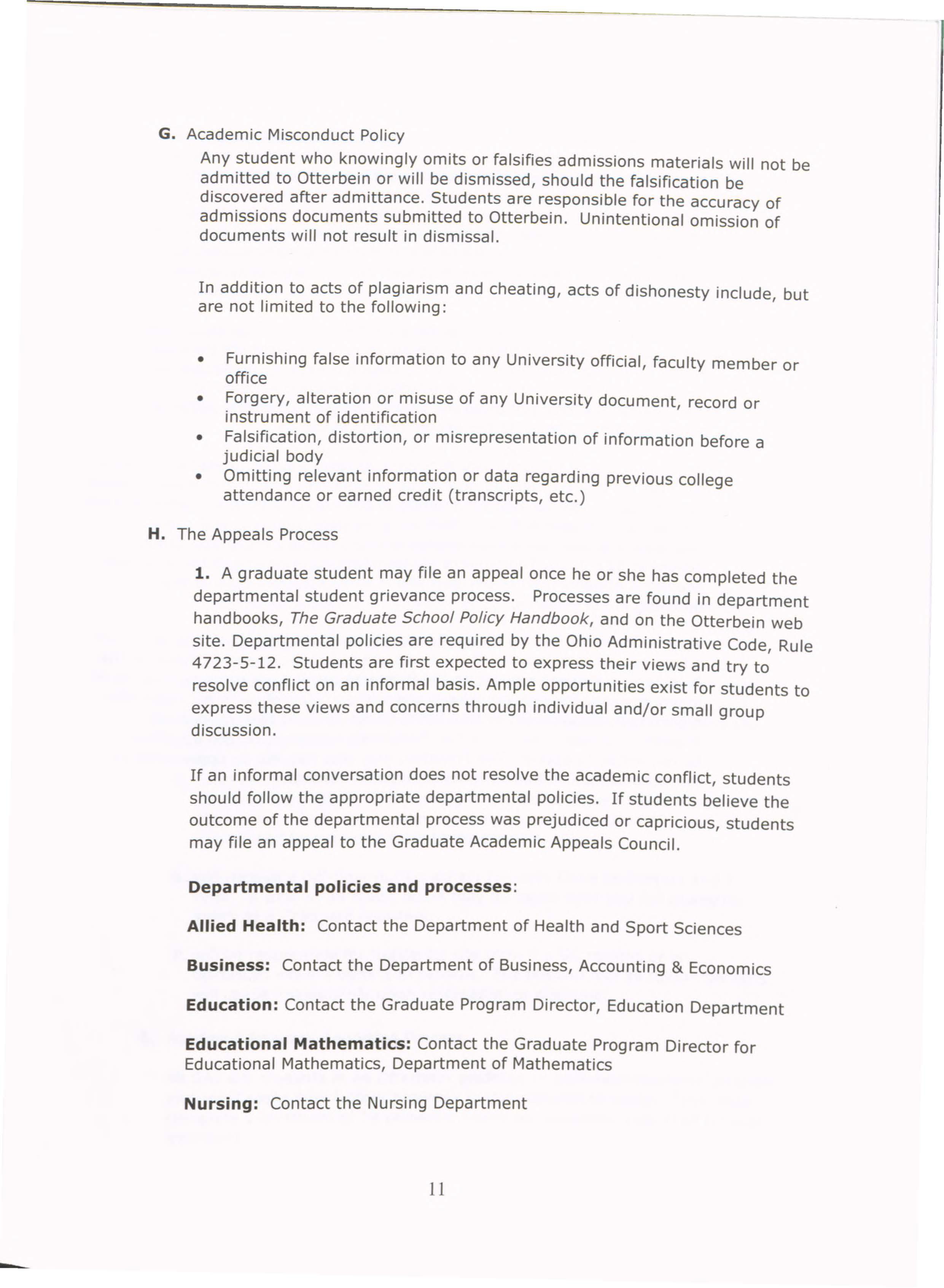
If an informal conversation does not resolve the academic conflict, students should follow the appropriate departmental policies. If students believe the outcome of the departmental process was prejudiced or capricious, students may file an appeal to the Graduate Academic Appeals Council.
Departmental policies and processes:
Allied Health: Contact the Department of Health and Sport Sciences
Business: Contact the Department of Business, Accounting & Economics
Educational Mathematics: Contact the Graduate Program Director for Educational Mathematics, Department of Mathematics
Nursing: Contact the Nursing Department
2. Graduate Students may appeal two types of decisions - 1) those regarding grades, academic progression, and/or academic misconduct made within the Department according to each Department's grievance policy, and 2) those decisions regarding academic standing made by the Dean of The Graduate School. Appeals for resolution of department policies or Dean's decisions must be made to the Graduate Academic Appeals Council within five (5) business days. The Graduate Committee oversees the Graduate Academic Appeals Council. Call The Graduate School at 823-3210 to request an appeal form and a hearing date and time.
3. The evidence leading to the decision to be appealed shall be presented by the student in writing to the department Director of Graduate Programs and to The Graduate School within five (5) business days of the department or Dean's decision. The chair of the Graduate Academic Appeals Council shall disseminate the information to the Council and set a meeting within five (5) business days of receiving the appeal and all evidence.
Pending action of the Graduate Academic Appeals Council, a student's status shall not be altered, nor the right to be present on campus and attend classes suspended, except for reasons relating to physical or emotional safety and the well-being of students, faculty/staff, or University property. For more information or questions on academic appeal, please contact The Graduate School at 823-3210. The student will be informed in writing of the Graduate Academic Appeals Council decision within three business days of that decision.
4. Procedure for Review by the President: A student has the right to submit a final appeal of a decision of the Graduate Academic Appeals Council to the President. A student requesting the President to review a decision must do so in writing, (not through email) explaining the reason(s), within a week after receiving notification (in written form) of the decision by the Graduate Academic Appeals Council. At the President's convenience, the appellant may be requested to appear. The President may also request an appearance by the chair of the Graduate Academic Appeals Council.
